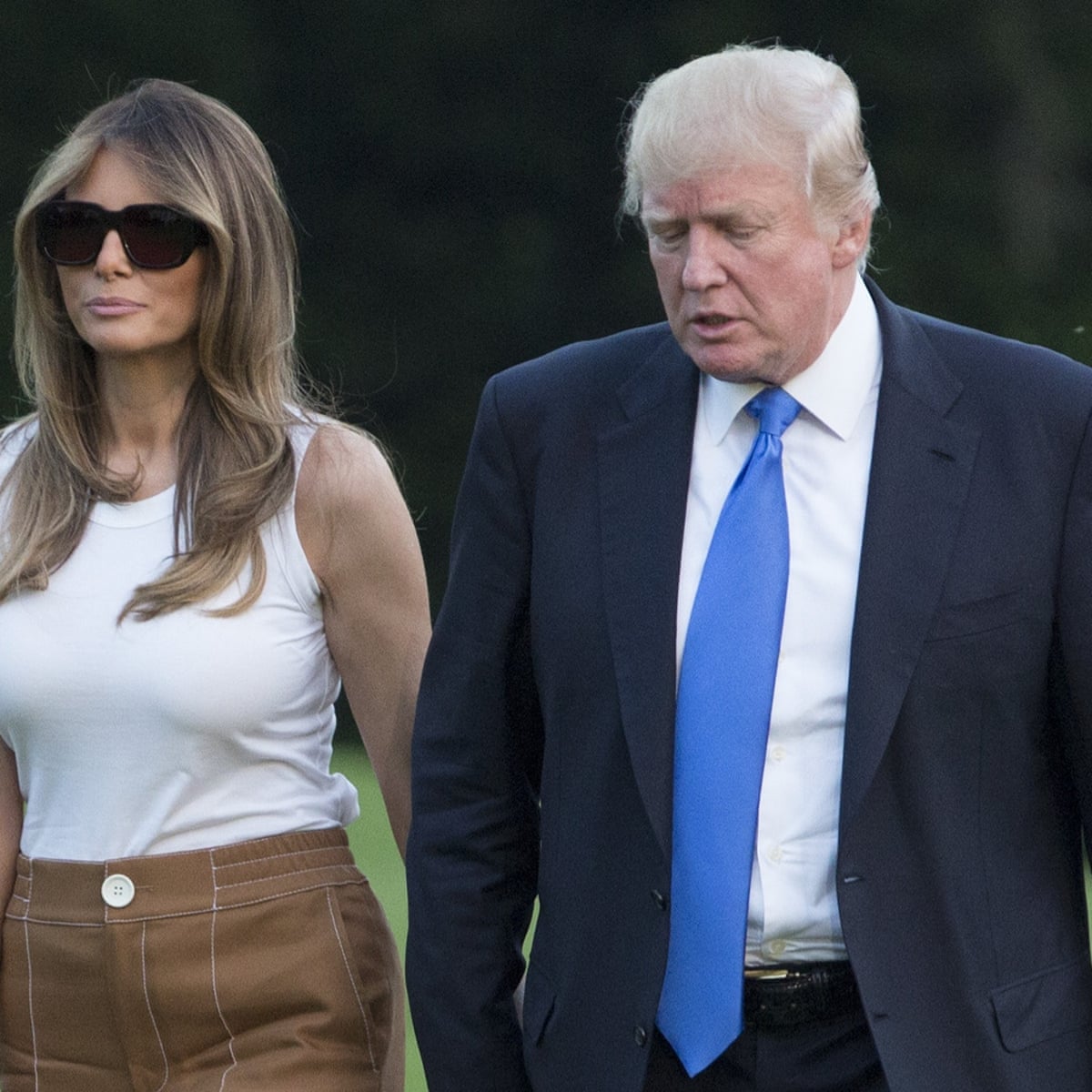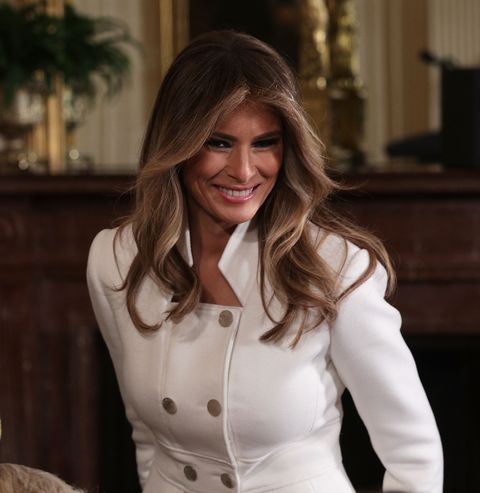Melania Trump initially stayed in NYC when Trump took office as leverage for renegotiating her prenup.
Jordan conducted more than 100 interviews for her book, and a major theme is that the first lady is as devoted to her own mythmaking as her husband: “Despite saying she wouldn’t get plastic surgery, three photographers who worked with her said they’ve seen the scars. She attended a highly competitive architecture program at the University of Ljubljana, but did not graduate, though she claimed in sworn testimony to have a bachelor’s degree. There’s also little evidence to suggest her claims of being able to speak four or five languages fluently are true. … Reporting in the book suggests she only speaks English and Slovene fluently.” (The book also says that she and Trump still live in separate bedrooms at the White House and whenever they travel, and that they’ll often be in the same building but not the same room.)
 Trump, Melania and baby Barron Trump. (Jean Baptiste Lacroix/WireImage/Getty Images)[
Trump, Melania and baby Barron Trump. (Jean Baptiste Lacroix/WireImage/Getty Images)[
The New York City mother known for sending emoji-filled texts was now being invited to give speeches around the country. For years, she and her husband had a bodyguard, but now she was being protected 24 hours a day by Secret Service agents. There was always someone standing guard outside her door, and the animosity directed at her husband worried her.
“At the core, I think she’s a private person who’s spent a lot of time adjusting to public life,” said one person who worked with Trump on the campaign and has remained close to the family.
Her father, Viktor — who bears an uncanny resemblance to his son-in-law, only five years his junior — was a chauffeur. Her mother, Amalija, worked in a clothing factory.
From an early age, Melanija was aware of her beauty, her tall, lithe figure, perfectly erect stature, and startling blue eyes. Thanks to her mother’s skill at sewing clothes, she and her sister were always impeccably dressed, unusual in drab, conformist, Communist Yugoslavia.
A good student, she began a competitive architecture program at the University of Ljubljana in the fall of 1989. Less than two years later, with the breakup of the Soviet Union, Slovenia declared its independence. But by then, Melanija had dropped out of college to pursue a modeling career; she changed her name to Melania Knauss and roamed through Europe seeking success, leaving few traces behind.
She immigrated to the United States with the help of an Italian modeling agent on a visitor’s visa and then secured an H-1B work visa, normally reserved for “distinguished merit or ability.” (She later received a green card through the elite EB-1 program, designed for those with “extraordinary ability.”) Her career was hardly distinguished, and suspicion about her immigration status lingers because the Trumps have never made the documentation public, despite promises to do so.
As a citizen, she was able to petition to bring her parents and sister to the United States, participating in the very “chain migration” that President Trump has repeatedly derided and curtailed.
Other first ladies have found the sudden adjustment difficult as well, and Melania, a careful planner, likes to take her time doing things. No matter how intense the pressure during the campaign, she refused to be hurried. The election night win came as a surprise even to Trump, according to many on his campaign, and little preparation had been done for what came next. Trump had even talked about going to one of his golf courses in Scotland immediately after the election so he didn’t have to watch Hillary Clinton bask in her success. One campaign aide recalled that candidate Trump had “told the pilot [of his private jet], ‘Fuel up the plane.’ ”
Trump had even talked about going to one of his golf courses in Scotland immediately after the election so he didn’t have to watch Hillary Clinton bask in her success. One campaign aide recalled that candidate Trump had “told the pilot [of his private jet], ‘Fuel up the plane.’ ”
 Trump had even talked about going to one of his golf courses in Scotland immediately after the election so he didn’t have to watch Hillary Clinton bask in her success. One campaign aide recalled that candidate Trump had “told the pilot [of his private jet], ‘Fuel up the plane.’ ”
Trump had even talked about going to one of his golf courses in Scotland immediately after the election so he didn’t have to watch Hillary Clinton bask in her success. One campaign aide recalled that candidate Trump had “told the pilot [of his private jet], ‘Fuel up the plane.’ ”
There was talk that Trump likely wouldn’t return to overseeing the Trump Organization after running the country, and Melania wanted to ensure that Barron got his rightful share of inheritance, particularly if Ivanka took the reins of the family business.
While she sorted out her plans as first lady and a new school for her son, she also worked on getting her husband to sign a more generous financial deal for her and Barron. It was smart timing.
“The best thing you can do is to deal from strength, and leverage is the biggest strength you can have,” Trump wrote in The Art of the Deal. “Leverage is having something the other guy wants. Or better yet, needs. Or best of all, simply can’t do without.”
While in New York, Melania had new leverage. The vacant first lady’s office annoyed him. He wanted her with him. A few of Trump’s pals were upset with Melania, not only because her decision to remain in Trump Tower fanned rumors they were not getting along. They also wanted her in the White House because when she was around, Trump was calmer. They believed that if she were with him, he would not have been tweeting as often and acting as impulsively.

As the weeks passed, more people around Trump began to appreciate Melania for what she brought to their relationship. At least one of Trump’s older children even called her, urging her to spend more time with their dad, telling her that he needed her balance. Melania knew that some people in New York dismissed her as a gold digger, but now, finally, others were starting to realize her worth.
Simply getting Barron to his classes unleashed massive traffic problems around his school, Columbia Grammar and Preparatory School on Manhattan’s Upper West Side. Many of the other parents were busy, wealthy people and some began to seethe over the disruption and inconvenience, including delayed drop-offs and pickups and being told to “hold” for Melania and Barron. Parents also worried about the safety of their own kids, even with the constant presence of the Secret Service. Not to mention that many of them were progressive New York Democrats who had voted for Hillary Clinton and couldn’t stand Trump.
That didn’t sit well with everyone around Trump.
Especially in the first two years of the administration, some in the White House felt that the West Wing was actively putting up roadblocks and purposely not lending support to the first lady’s office. Ivanka is both especially close to her father and spent far more time around him than his other children. Not only did father and daughter work closely at the Trump Organization but she also had played a key role in his campaign, and now was the child with the most active role inside the White House.
With Melania away, Ivanka used the private theater, with its plush red seats, and enjoyed other White House perks. Some said she treated the private residence as if it were her own home. Melania did not like it. When she and Barron finally moved in, she put an end to the “revolving door” by enforcing firm boundaries. People working in the West Wing say they have heard Trump criticize Don Jr. and Eric and even Ivanka for doing or saying something that the president thought was not helpful, but none could recall hearing him say anything negative about Melania. He appreciated that she didn’t need publicity, and that she didn’t boast about her influence, saying little more in interviews than “sometimes” he listens and sometimes he doesn’t.
People working in the West Wing say they have heard Trump criticize Don Jr. and Eric and even Ivanka for doing or saying something that the president thought was not helpful, but none could recall hearing him say anything negative about Melania. He appreciated that she didn’t need publicity, and that she didn’t boast about her influence, saying little more in interviews than “sometimes” he listens and sometimes he doesn’t.
 People working in the West Wing say they have heard Trump criticize Don Jr. and Eric and even Ivanka for doing or saying something that the president thought was not helpful, but none could recall hearing him say anything negative about Melania. He appreciated that she didn’t need publicity, and that she didn’t boast about her influence, saying little more in interviews than “sometimes” he listens and sometimes he doesn’t.
People working in the West Wing say they have heard Trump criticize Don Jr. and Eric and even Ivanka for doing or saying something that the president thought was not helpful, but none could recall hearing him say anything negative about Melania. He appreciated that she didn’t need publicity, and that she didn’t boast about her influence, saying little more in interviews than “sometimes” he listens and sometimes he doesn’t.
At the White House, Trump felt he was surrounded by people who were constantly jockeying for position and focused on their own self-interest, and he valued Melania’s loyalty and insights more than before he entered politics.
Sean Spicer, the president’s first communications director, explained the dynamic this way: “Melania is very behind-the-scenes but unbelievably influential. She is not one to go in and say, ‘Hire this person, fire this person.’ But she lets the president know what she thinks, and he takes her views very seriously.” Rather than tell Trump what to do or not do, Melania’s style is to give her opinion, and in the end, “he tends to agree with her,” Spicer said.
Trump will sometimes ask, “This is what Melania thinks. What do you think?”
Spicer recalled a phone conversation he had with Trump after leaving the White House. Spicer made a comment, and Trump replied, “You know what? Melania says the same thing. You are right.”
Over time, it became clear to those working in the West Wing that Trump placed significant value on those Melania liked (such as counselor Kellyanne Conway) and those she didn’t (including chiefsof staff Reince Priebus.) It also became clear that one of the most lethal places to find oneself was in Melania’s crosshairs. As one former White House official said: “People cross Melania at their own risk — and that risk is, ‘off with your head.’ I’m not kidding. . . . You are gone if she doesn’t like you.”
Melania moved into the White House on June 11, 2017, with almost no fanfare. She is not nearly as active on social media as her husband. But on moving day she replaced the White House chief usher. She selected Timothy Harleth, who had been the director of rooms at the Trump International Hotel in Washington. Trump might not be able to live at his local Trump property, but that did not mean that the Trump property could not, in many ways, be brought to him. And his wife, the newly arrived first lady, would be the one to do it.


